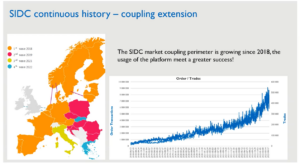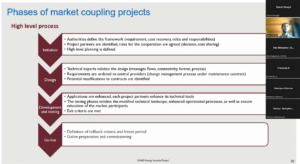On September 29th, the USAID Energy Security Project (ESP), jointly with EPEX SPOT, conducted the 5th and final workshop on the Roadmap and Capacity Building on Electricity Market Coupling Activity.
USAID ESP partners in Ukraine’s energy sector, including representatives of the National Energy and Utilities Regulatory Commission (NEURC), the Ministry of Energy of Ukraine, NPC “Ukrenergo,” Market Operator, and the Ukrainian Energy Exchange, took part in the training.

The workshops arranged by USAID ESP offered the energy sector actors technical expertise and instruments for market system coupling to reduce price risks.
During the training, EPEX SPOT experts:
- Described the development and operations of the EU day-ahead and intraday markets as well as algorithms of market integration;
- Shared their valuable experience of implementing day-ahead market coupling projects in various European countries, including the requirement of creating a clear structure, reliable way of market segment operation, and a high level of exposure.
In addition, the workshop participants discussed the issue of coupling the EU intraday electricity markets that allow continuous electricity trading in the All-European market when such electricity is needed. According to EPEX SPOT experts, the geography of intraday market coupling projects has been increasing since 2018. It was made possible because the integrated intraday market improves the efficiency of electricity trading and market liquidity, enhances competition, and reduces the risks for traders.

The successful implementation of the market integration initiative, as the experts noted during the USAID ESP workshop, allows the stakeholders to be involved from the very beginning up to the end through all stages of the initiative, including:
- National regulators, which issue directives, guidelines, and methodologies that govern the participation of the national electricity market operator or the Transmission System Operator in implementing the initiative;
- National electricity market operator, the Transmission System Operator, and other authorized organizations at the stage of the initiative implementation actions as well as the respective reporting on the activity;
- Service providers who oversee updating the technical platform of day-ahead or intraday electricity markets, etc.;
- Market participants as an essential initiative client who expects larger trading capacities or more reliable operational processes and will be direct or indirect results users.
During the 5th workshop, the participants also considered the main phases of the electricity market coupling initiatives, examples of regulatory, legal, and technical frameworks that ensure market integration, key stages to be determined by the road map, and the methodology of its implementation.
The successful coupling of electricity markets will help all market participants increase the transparency of transactions and improve market liquidity. USAID ESP will continue the coupling activity in the electricity markets of Ukraine and the EU under close cooperation with Ukrainian partners to develop a detailed Roadmap related to the electricity markets’ integration with the EU and Moldova markets.
